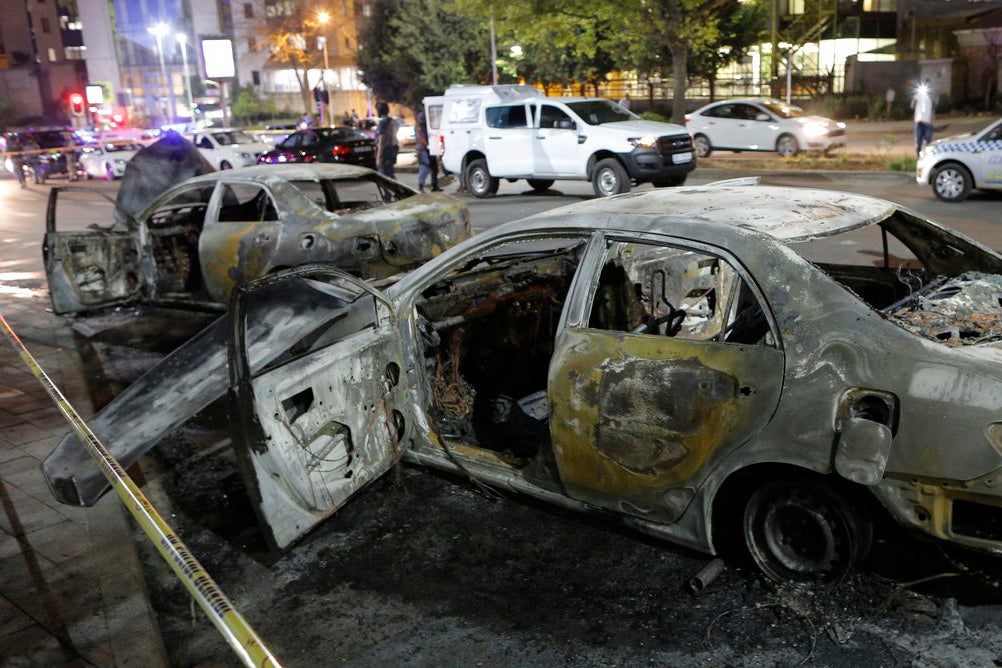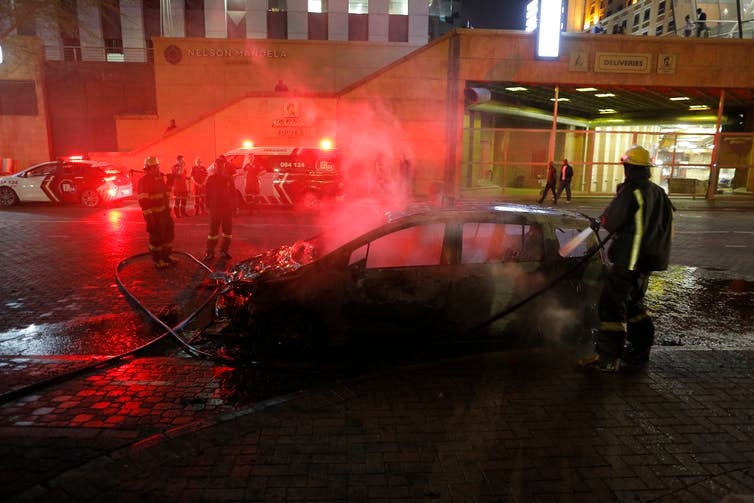What the violent 'Uber wars' tell us about Zuma's South Africa
Economic inequality and distrust in government is causing outbreaks of violence on South Africa's streets

Defying accusations of cronyism, nepotism and facilitating state capture, South Africa’s president, Jacob Zuma, recently survived his eighth parliamentary vote of no confidence – and immediately afterwards, the rand took a further dive, dropping to a one-month low. Clearly the country’s troubled leadership and struggling economy are as entwined as ever.
Zuma’s African National Congress (ANC) continues to pay lip service to radical economic transformation, but little has been done to bolster the economy or equitably distribute national resources, radically or otherwise. Instead, under Zuma’s leadership, the public sector wage bill has skyrocketed, the economy is stagnant, and unemployment has risen to 28 per cent.
All the while, state institutions are being repurposed to consolidate power for Zuma and his ANC party loyalists. Many in South Africa now see the ANC leadership as part of a corrupt power elite, and are losing confidence in the structures of government.
But how is corruption at the highest levels of government and economic inequality affecting the lives of ordinary South Africans? For some of South Africa’s working class and even the upwardly mobile, everyday economic struggles have become a matter of life or death. This tension is evident in the growing violence between metered taxi drivers and Uber drivers.
Under pressure
South Africa’s taxi industry has seen extreme violence before. The “Uber wars” of 2017 recall for many the “taxi wars” that began in the late apartheid era, where turf wars were fought between taxi associations and individual minibus taxi drivers. During that period, hundreds of people were killed as rival cartels went to war to defend their market share.

A paucity of reliable and inexpensive public transport means that around 65 per cent of South Africa’s low-income commuters depend on shared taxi minibuses, and until recently, most in the middle-class tended to drive their own cars, sober or otherwise. But when Uber arrived in South Africa in 2013, things changed dramatically.
Today, metered taxi drivers are arguing that Uber drivers are stealing their business. But many of Uber’s new clientele claim they have long avoided metered taxis on the grounds that they are expensive and unsafe. During our research in South Africa, members of the police told us that middle-class people began using it in such large numbers that the number of drunk-driving charges plunged (as did the revenue traffic police extracted from them).
As the demand for Uber has grown, more and more drivers are registering. Along with South African drivers are many Zimbabweans fleeing the collapse of their country’s economy. They’re often not eligible for other forms of employment, but many meet Uber’s background checks, car and driving checks, and so can earn a living as drivers in South Africa’s urban centres. This has only turned Uber into a flashpoint for existing tensions over employment and wages.
Your driver is approaching
Two Uber vehicles were torched last week outside an upmarket shopping mall in Johannesburg. A metered taxi was attacked the next morning. In July 2017, the current turf war claimed its first life when Lindelani Mashau, an Uber driver, was set alight by unknown individuals, allegedly a group of metered taxi drivers. He died in hospital from his injuries several days later. Both Mashau’s death and the recent torchings are an escalation of metered taxi drivers’ increasingly desperate attempts to protect their livelihoods against what they see as a serious threat.
The violence has reached such a level that Uber itself issued a statement calling on South African authorities to step up their response and help protect its drivers, many of whom are afraid to do their jobs – particularly around the train stations in Johannesburg and Pretoria, where most of the attacks have occurred.
During a recent trip to the two cities, we repeatedly struggled to order an Uber either to or from the Gautrain, the train linking the two cities. Some drivers sent texts asking us to meet blocks away. Others gave up and cancelled the ride after circling our waiting spot, too hesitant to pick us up. Another urged us to “Hurry! Get in quickly!” as he sped away from men who eyed the car suspiciously.
On another ride, men yelling “Uber!” surrounded our driver’s car as he scrambled to leave. He told us that he’d recently been chased at high speed by two taxis while his passenger cowered with fear in the back seat.
During our next trip, a female driver asked one of us to sit in the front passenger seat, to “act chatty”, and to give her a hug upon exiting the ride. We hugged her in full view of watching taxi drivers and the ride was undisturbed. But most drivers don’t have the option of feigning family relationships.
The violence in South Africa’s urban capitals – including the killing and intimidation of Uber drivers – reflects some of the major tensions threatening to tear apart South Africa’s social fabric. In particular, they stem from a fundamental economic problem: while South Africa needs to develop a more flexible labour market, many South Africans are loath to share work opportunities when so many are unemployed.
Many of the South Africans we spoke with were convinced none of these challenges will be solved until Zuma steps down in 2019, at the end of his second term. But it is unclear if whoever succeeds him will be able to address the severity of South Africa’s economic woes.
Rosita Armytage is a research fellow (governance & society) at the University of Birmingham; Markus Bell is a social anthropologist and lecturer at the University of Sheffield. This article was originally published on The Conversation (www.theconversation.com)
Join our commenting forum
Join thought-provoking conversations, follow other Independent readers and see their replies
Comments
Bookmark popover
Removed from bookmarks